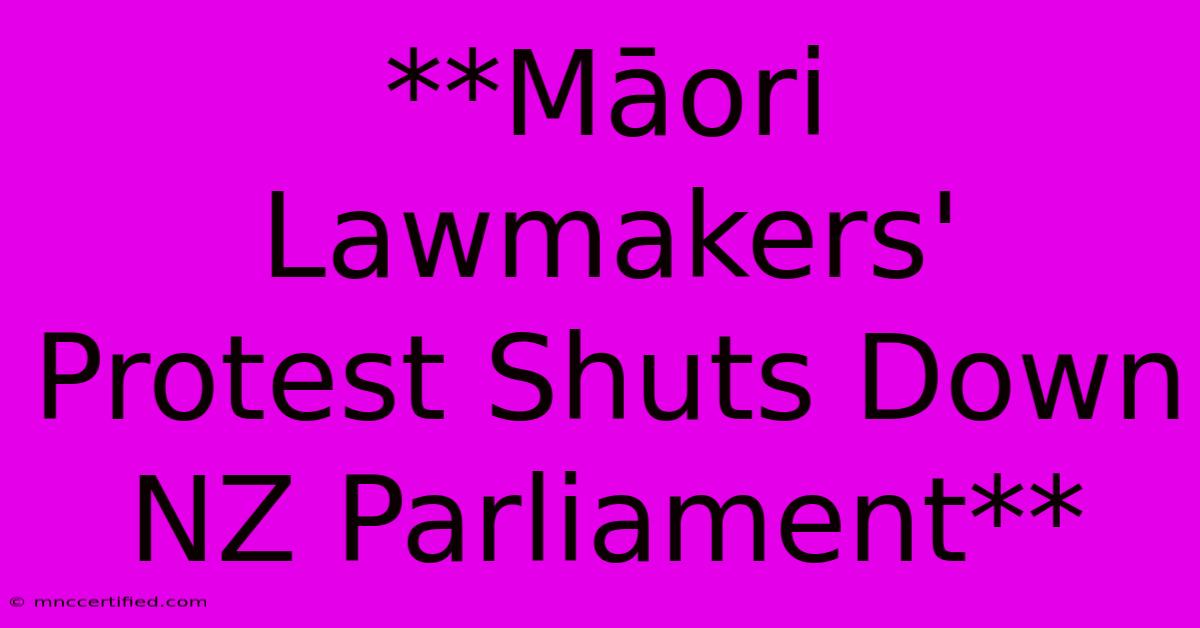**Māori Lawmakers' Protest Shuts Down NZ Parliament**

Table of Contents
Māori Lawmakers' Protest Shuts Down NZ Parliament: A Deep Dive into the Issues
On [Date of Protest], New Zealand's Parliament came to a standstill as Māori lawmakers staged a powerful protest, shutting down proceedings and bringing national attention to critical issues impacting the Indigenous Māori community. This dramatic action highlighted deep-seated grievances and demands for significant policy changes. This article delves into the reasons behind the protest, the specific demands of the protesters, and the broader implications for New Zealand's political landscape.
The Underlying Issues Fueling the Protest
The protest wasn't a spontaneous event; it was the culmination of years of frustration and unmet expectations. Several key issues fueled the lawmakers' actions:
1. Treaty of Waitangi Breaches:
The Treaty of Waitangi, signed in 1840, is the foundational document of New Zealand. However, Māori argue that successive governments have consistently breached the Treaty, leading to injustices in areas like land rights, resource management, and self-determination. The protest served as a stark reminder of these ongoing breaches and the need for genuine reconciliation. Specific examples of Treaty breaches cited by protesters should be detailed here (insert specific examples with citations).
2. Inadequate Representation and Marginalization:
Māori feel their voices are not adequately heard in the political process. Despite comprising a significant portion of the population, Māori feel underrepresented in Parliament and decision-making processes. This lack of representation translates to policies that often fail to address their unique needs and concerns. The demand for greater Māori representation and political autonomy was a central theme of the protest.
3. Socioeconomic Disparities:
Significant socioeconomic disparities exist between Māori and non-Māori populations. Issues like higher rates of poverty, lower life expectancy, and inadequate access to healthcare and education are long-standing challenges. The protest emphasized the urgent need for government action to address these disparities and improve the well-being of Māori communities. Statistics showcasing these disparities should be included here (insert relevant statistics with citations).
4. Co-governance and Self-determination:
The concept of co-governance, where Māori and the Crown share decision-making power over matters affecting Māori, has become a focal point of debate. Protesters argued for a greater degree of co-governance and self-determination, asserting their right to manage their own affairs and resources. This demand reflects a broader push for Māori sovereignty and control over their own destiny.
The Demands of the Māori Lawmakers
The protest was not simply a demonstration of anger; it presented concrete demands to the government. These demands likely included (and should be specifically listed here, sourced if possible):
- [Specific Demand 1 - e.g., Increased funding for Māori health initiatives]
- [Specific Demand 2 - e.g., Amendments to legislation to better reflect Treaty obligations]
- [Specific Demand 3 - e.g., Establishment of a Māori-led commission to oversee Treaty settlements]
- [Specific Demand 4 - e.g., Greater Māori representation in government bodies]
Implications and Future Outlook
The protest had significant implications, forcing the government to confront long-standing issues and engage in meaningful dialogue with Māori leaders. The shutdown of Parliament underscored the gravity of the situation and the determination of Māori lawmakers to achieve meaningful change. The long-term impact will depend on the government's response. Will it engage in genuine reconciliation and address the underlying issues, or will the protest be seen as a temporary disruption? Further analysis of potential outcomes and ongoing political discussions should be included.
Conclusion: A Call for Action and Reconciliation
The Māori lawmakers' protest served as a powerful reminder of the unfinished business of the Treaty of Waitangi and the ongoing struggle for Māori rights and self-determination. The event highlighted the urgent need for systemic change and a genuine commitment from the New Zealand government to address the deep-seated issues facing the Māori community. The outcome of this protest will significantly shape the future of New Zealand's political landscape and its relationship with its Indigenous population. Further research into the government's response and the ongoing dialogue is crucial for understanding the long-term implications of this significant event.
Keywords: Māori protest, New Zealand Parliament, Treaty of Waitangi, co-governance, Māori rights, Indigenous rights, self-determination, socioeconomic disparities, political representation, land rights, New Zealand politics, Māori sovereignty.

Thank you for visiting our website wich cover about **Māori Lawmakers' Protest Shuts Down NZ Parliament** . We hope the information provided has been useful to you. Feel free to contact us if you have any questions or need further assistance. See you next time and dont miss to bookmark.
Featured Posts
-
Bluesky Outage Amidst User Surge
Nov 15, 2024
-
Brotherly Shove Propels Eagles 76 Yard Td Drive
Nov 15, 2024
-
Usa Vs Jamaica Key Players And Formations
Nov 15, 2024
-
Aldis Hodge Fatherhood Shaped Cross Performance
Nov 15, 2024
-
How To Watch Eagles Vs Commanders
Nov 15, 2024